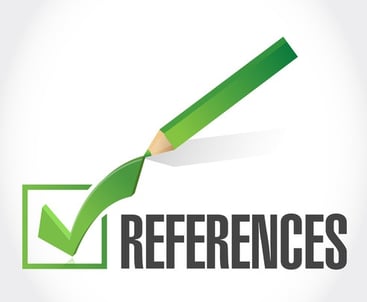 Reference checking is a hiring tactic that has faced a lot of discussion. Some HR professionals rely on it for vetting candidates. Other view it as a waste of time and effort. When implemented correctly, references can provide necessary information and insight into whether a candidate will be a good fit in your company. Use these five tips to get the most from you next reference check.
Reference checking is a hiring tactic that has faced a lot of discussion. Some HR professionals rely on it for vetting candidates. Other view it as a waste of time and effort. When implemented correctly, references can provide necessary information and insight into whether a candidate will be a good fit in your company. Use these five tips to get the most from you next reference check.
Use Professional References Only
Personal references are outdated and mostly useless. Unless someone simply can't find a personal reference, which should be a red flag, a call to a personal reference is only going to tell you the candidate is a great person and friend. Strike out the personal reference option from your hiring form and don't contact anyone outside of professional references.
Get on the Phone
To get a solid reference, you need to talk to someone. Written references don't allow additional questions and may not even be written by the reference. Often, job candidates will take care of the writing, allowing their reference to only sign their name or send the email. A phone reference can allow additional questions as well as hear non-verbal cues as to whether the candidate would be a good fit. Don't try to reduce the time spent on references by using written communication, make a ten minute phone call.
Keep Questions Open
If you're contacting someone from the candidate's reference list, chances are they've been contacted by the candidate and are willing to give a glowing reference. That doesn't mean the reference won't divulge other information, if asked the right way.
Keep questions open-ended to get the most information about a candidate. Rather than asking "Would you consider this candidate a hard worker?" say something like, "What can you tell me about this candidate's work ethic?" While a reference would obviously say yes to the first question, the second may involve a story that shows while they candidate has a solid work ethic, they also prefer to work alone or work better in a team. Avoid asking pointed questions during reference checks to find out more information about your candidate.
Contact Companies
Many companies have policies which preclude their HR department from giving any information beyond whether the employee worked at their company. This has led many businesses to stop contacting a job candidate's former employers altogether. Don't fall into this trap! Companies that have these policies can at the very least agree that the candidate worked there and whether they left or were fired, both of which are great pieces of information. Make a call to your candidates' former employers to confirm employment and, hopefully, get additional questions answered.
Reach Out to Direct Supervisors
The best references come from direct supervisors. If they aren't listed on your candidate's reference list, contact the company and ask to speak to your candidate's former supervisor. These are generally the most balanced and fair people to contact. They've had the employee work for them and can speak to their work ethic, their teamwork skills, and their overall fit with the company. Remember, even if they aren't listed under references, former employers should be contacted to get the best review of a candidate.
Reference checks don't need to be particularly time-consuming or useless. By keep questions open-ended, going after the most effective references, and requesting phone references, HR professionals can gain useful information during the hiring process.